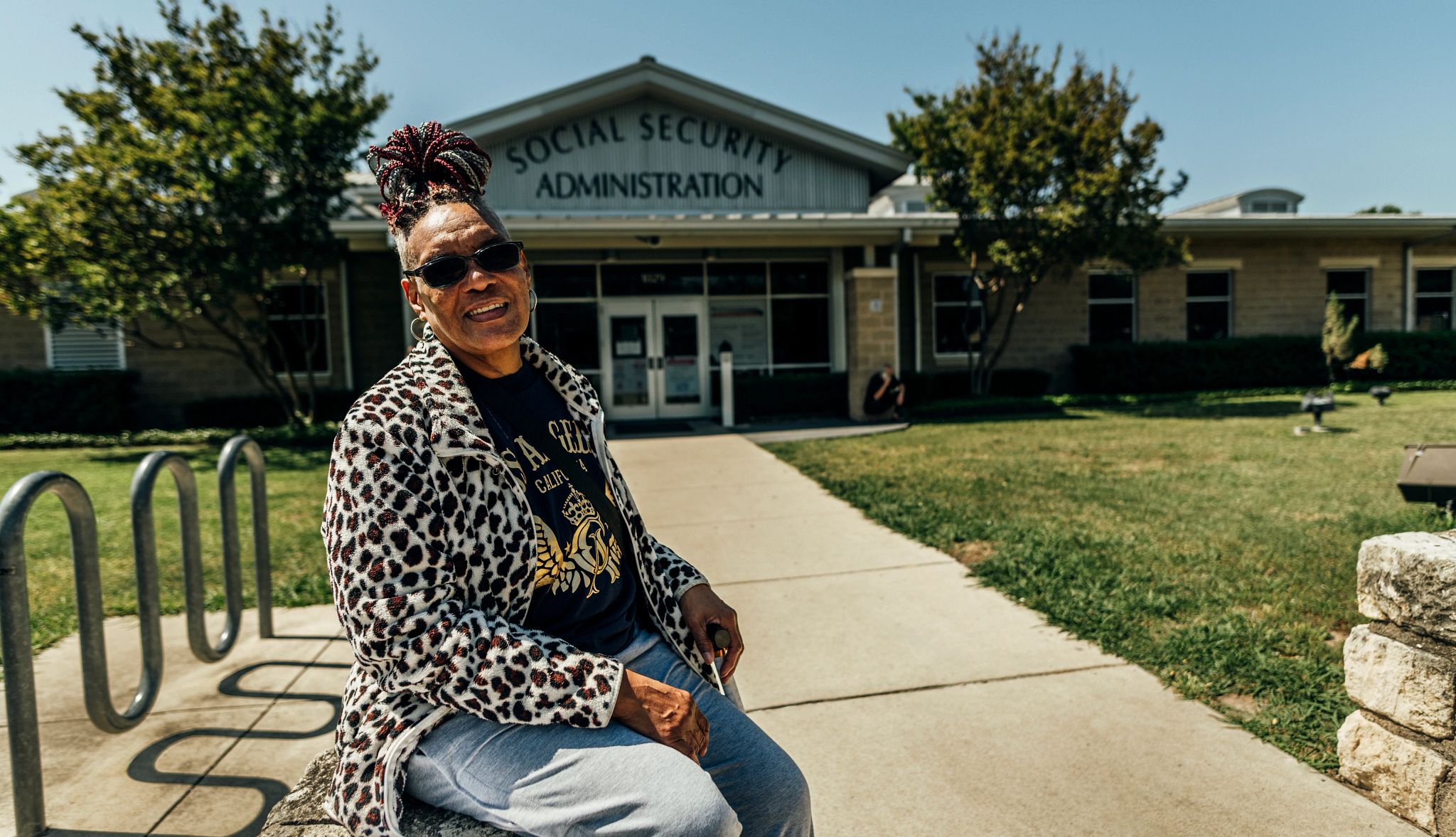
On Social Security’s Front Lines, Customers Seek Service — and Reassurance
- Select a language for the TTS:
- UK English Female
- UK English Male
- US English Female
- US English Male
- Australian Female
- Australian Male
- Language selected: (auto detect) - EN
Play all audios:
Sandra Hamm, a Social Security and Supplemental Security Income recipient, went to her local SSA office in Austin, Texas, after receiving a series of letters from the agency about her
benefits. "I felt I needed to talk to somebody," she says. Arturo Olmos Facebook Twitter LinkedIn
These are uncertain times at Social Security field offices.
In the last two months, the Social Security Administration (SSA) has begun shrinking its staff with a goal of shedding 7,000 jobs, more than 12 percent of its workforce. Nearly 2,000
frontline workers at local offices have left as part of a buyout program.
Amid this restructuring, the agency announced, amended and then abandoned a plan to implement new identity-proofing requirements that would have severely restricted people’s ability to apply
for benefits by phone.
This comes as the SSA transitions to appointment-only service at its more than 1,200 local offices, putting more pressure on its overwhelmed toll-free phone line as more people call to
schedule visits.
The agency, which administers $130 billion in monthly payments to more than 73 million Americans, said in a recent statement recognizing April as National Social Security Month that it is
“surging employees in support positions to front-line service positions.” Many field offices are seeing an influx of customers, some seeking certainty that policy and personnel changes won’t
affect their benefits, others simply tired of waiting hours on the phone to get routine help.
“The customer service crisis at Social Security has been building for years. As the population ages, demand is going up — but funding from Congress hasn’t kept pace, and now we’re seeing
even more staffing cuts without a clear plan to improve service,” says Bill Sweeney, AARP’s senior vice president for government affairs.
“Americans have paid into Social Security their whole working lives, and they’ve paid for the support that comes with it,” he adds. “Anything less is unacceptable.”
Amid the deepening crisis, AARP visited three SSA offices in different parts of the country to ask customers about their experience and their concerns.
Video: Two Ways Social SecurityCustomer Service is Changing Middletown, New York: ‘I came here to make sure I don’t lose anything’
April 8 dawns blustery and unseasonably cold in this Hudson Valley town, and rather than lining up outside the local Social Security office, the people who started arriving nearly an hour
before the 9 a.m. opening are keeping warm in their cars, eyeing the sprawling brick building’s double glass doors.
When the doors open, customers are invited to sit inside as they wait their turn to get information about benefits, report an address change, obtain paperwork or seek other services.
Amid news reports about Social Security staff reductions and plans to restrict phone service (plans the SSA announced later that day that it was retracting), some say they’ve come for
face-to-face reassurance that the agency’s churn wouldn’t affect their benefits.
“I came to make sure I don’t lose anything,” says Benjamin Washington Taylor, 76, of Middletown, braving the wind on a bench while waiting for a bus to take him home.
Having read about the cutbacks and changes, he says, he went to the office “out of an abundance of caution” to verify that the SSA’s information on him is correct. A conversation with an
office staffer quelled his fears. “Thankfully, there's nothing to worry about. According to the lady, I am updated.”
Deborah Gilbert-Mann, 59, of Bloomingburg, New York, brought her husband, George Mann, 69, straight to the office from his dialysis appointment to secure an official letter verifying his
benefits. That service is available online, but “it’s easier just coming in person,” she says.
Deborah L. Gilbert-Mann at the Social Security office in Middletown, New York. She says theSSA's online services aren't helpful for her husband, who "doesn’t know how to use a smartphone or a computer." Michael George
As she disassembles her husband’s wheelchair to put it in her car, Gilbert-Mann voices alarm at the prospect of the SSA losing workers and making it harder for people like him to access
services.
“It would be a concern because not everybody is computer-savvy,” she says. “He doesn’t know how to use a smartphone or a computer, so they would need to keep staffing the way it is.”
Robert Crump is in the same boat. The 60-year-old New York City resident says he lacks computer skills and could not report a recent change of address online, which resulted in him missing
his disability benefit check. Much to his relief, an agent at the Middletown office was able to process his address change, void the old check and issue a new one.
“It was very professional and courteous,” Crump says. He says all the agents at the office were busy assisting customers during his visit and that he doesn’t think a reduced staff can
maintain service levels there.